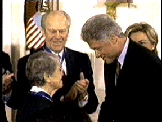|
Para ver este documento
en español, oprima aquí.
Puerto Rico Profile: Sr. Isolina Ferre
January 14, 2000
Copyright © 2000 THE PUERTO RICO HERALD. All Rights Reserved.
 Over
the last century, the people of Puerto Rican have made great contributions
to life in the United States. They have been soldiers in times
of war, and politicians in times of peace. They are musicians,
athletes, and actors; doctors, lawyers, and engineers. They have
enriched the culture, defended the values, and fulfilled the aspirations
of the United States. Over
the last century, the people of Puerto Rican have made great contributions
to life in the United States. They have been soldiers in times
of war, and politicians in times of peace. They are musicians,
athletes, and actors; doctors, lawyers, and engineers. They have
enriched the culture, defended the values, and fulfilled the aspirations
of the United States.
Yet perhaps no Puerto Rican has offered so great a spiritual
gift to the United States as Sister Isolina Ferre. In her 85
years, Sister Isolina has worked among the poor on her native
island and throughout the United States. She has been a model
not only of selflessness and charity, but also of immense courage
and ingenuity. She has provided the poor with inspiration, hope,
and the promise of peace and prosperity, inspiring one writer
to call her the "Mother Teresa of Puerto Rico."
Isolina Ferre belongs to one of the most wealthy and influential
families in Puerto Rico. Her brother, Luis A. Ferre, is a well-known
former governor of Puerto Rico and the founder of the New Progressive
Party. Her nephews include the president and editor of the newspaper
El Nueva Dia, the president of Puerto Rico Cement, and
the former mayor of Miami.
Sister Isolina knew early in her life, however, that she did
not want to be rich and powerful. She therefore decided to devote
her life to God and those less fortunate than herself. When she
was only 21, she went to Philadelphia to join the Sisters of the
Blessed Trinity.
Over the next 30 years, Sister Isolina labored tirelessly to
improve the situation of the desperately poor of the United States.
She worked with Appalachian coal miners in West Virginia, with
Portuguese immigrants in Massachusetts, and with inner city youth
in Brooklyn.
Service to the poor and powerless often goes unrecognized,
but Sister Isolina's success made her contributions impossible
to ignore. In New York, she became famous for her work at the
Doctor White Community Center in the late 1950s and '60s. There
she was able to mediate between warring African American and Puerto
Rican gangs, teaching them to resolve disputes without violence.
In 1969, Sister Isolina returned to Puerto Rico, ostensibly
to retire. Her work, however, was only beginning. Confronted
with the poverty in her native Ponce, Sister Isolina developed
a network of community action centers in impoverished neighborhoods.
Her strategy was to provide the people of Ponce with the tools
to create a future for themselves.
One of the most important of these tools is self esteem. Sister
Isolina understood how poverty robs people of their dignity, and
she realized the need to instill in them a strong sense of self
worth. She began by handing out cameras. This innovative program
taught photography to children in Ponce in order to show them
the importance of their individual visions of the world.
From these simple beginnings, Sister Isolina has established
an entire network of facilities to empower the poor. Today there
are five Centros Sor Isolina Ferre in Puerto Rico. The centers
provide high school equivalency education and job training, as
well as programs dedicated to strengthening families and stopping
juvenile delinquency. With 350 employees and a combination of
public and private funding, the Centros Sor Isolina Ferre help
10,000 people every year. As for the photography program, it
has entered the digital age. Now students are taught to use high
tech cameras to take photos that are developed and manipulated
on computers.
In recent years, Sister Isolina Ferre has been recognized for
her lifetime of work for the poor. In 1989, she received the
Albert Schweitzer Prize for Humanitarianism. Last August, Sister
Isolina was awarded the Presidential Medal of Freedom. She became
the fourth Puerto Rican to receive this distinction, which is
the nation's highest civilian honor. The other three Puerto Rican
recipients were Luis Muñoz Marín, Antonia Pantoja,
and Sister Isolina's brother, Luis A. Ferre.
During the Medal of Freedom presentation ceremony in August,
President Clinton stressed the importance of those who strive
"to improve the human condition, to deepen the reach of freedom,
to widen the circle of opportunity, to strengthen the bonds of
our national community." The First Lady added that the individuals
being honored had "helped fulfill America's promise by reaching
out to the marginalized and the powerless, including our youngest
citizens, and lifting them up to recognize their own gifts and
abilities."
Presenting Sister Isolina with her Medal of Freedom, the President
remarked, "Sister Isolina once said that a community grows
only when it rediscovers itself. On behalf of the many communities
you have helped to make that wonderful discovery, a grateful nation
say thank you." Sister Isolina reacted with characteristic
humility and grace. "I thank God for the honor," she
said, "not only for me, but for all those who work with me
and for the community."
| 
